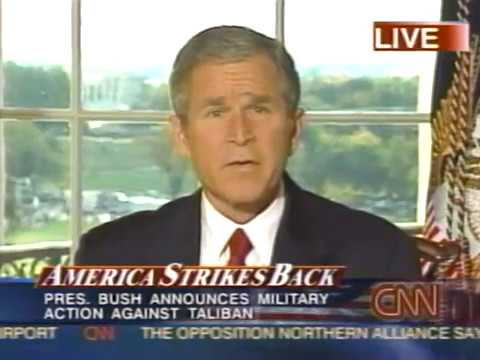The Terrorists Won

Image courtesy of CNN
By Fabrizio Gowdy
This week, we marked twenty years since 9/11. With each passing year, an uncomfortable truth becomes more obvious: the terrorists won, not because of what they did on September 11, 2001, but rather as a result of the United States’ response in the months and years after the attack. We plunged into costly, prolonged military intervention in the Middle East.
Domestically, we quickly surrendered our liberty and privacy rights for the promise of security. And on the most fundamental level, we seem to have accepted a new permanent status quo of surveillance and paranoia that represents a departure from the American cultural identity and way of life. Our response to 9/11 has made us weaker, poorer, and less free.
On September 10, 2001, America stood atop the world, a lone superpower still basking in its triumph over the USSR. September 11th should be considered the beginning of our decline from the height of our global power. We invaded Iraq and Afghanistan, wars that to date have cost American taxpayers $2 trillion and $2.3 trillion respectively. An estimated 801,000 Afghans and Iraqis perished in these wars, 335,000 of whom were civilians.
In the end, what did we achieve? We handed Afghanistan back to the Taliban, only now they have billions of dollars worth of state-of-the-art military equipment.
We also rarely consider the possibility that our constant meddling in the Middle East is the cause of much of the anti-American sentiment in the region. We can’t expect to strip people of their sovereignty and control other nations’ domestic affairs without experiencing massive blowback. In 1953, the U.S. engineered a coup and installed the Shah in Iran; 26 years later angry Iranians took our embassy and 66 hostages.
Our failed invasion and occupation of Afghanistan will be remembered for its hubris, especially in regards to our ill-advised attempt to install a Western-style democracy. How arrogant is the U.S. to think that it can defy all historical precedent? Why did the U.S. Military think it could march into the graveyard of empires, politically unify a country that has consisted of feuding warlords for virtually all its history, and establish a democracy where one has never existed?
Democracies cannot be willed into existence; they develop painstakingly slowly along with cultural attitudes and views on individual rights and human liberty. Britain’s democracy is healthy and functioning because it has 800 year-old roots going back to the Magna Carta.
Afghanistan has no such history. Furthermore, why is it our role to go around forcing democracy on people who do not want it? Many undemocratic countries exist today; we don’t possibly have the money or manpower to invade and occupy them all for decades on end until Western democracy flourishes. Empires die when they overextend and spread themselves too thin militarily, incurring massive debt in the process and neglecting domestic issues.
Ironically, as we were busy trying to secure freedom and democracy for the people of Afghanistan, our government was actively restricting American citizens’ freedoms. The 2001 USA PATRIOT Act, “the most unpatriotic of acts,” as Kentucky Senator Rand Paul dubbed it, quietly authorized unconstitutional operations of mass surveillance against the general American populace and allowed for bulk data collection.
The act was an assault on the Fourth Amendment; if widespread, indiscriminate surveillance and collection of Americans’ activities and records is not “unreasonable search and seizure,” then what is? Rather than prosecuting whistleblower Edward Snowden, we should give him a pardon and a medal of freedom for defending Americans’ constitutional rights.
The FISA courts meant to check the surveillance state have proved to be a rubber stamp, denying just 12 warrants out of over 33,000 requested. The framers specifically included the 4th amendment because of the British writs of assistance, essentially generalized search warrants. The British officials who broke down colonists’ doors and trifled through their papers would be envious of the ease with which the NSA can monitor millions of Americans.
On a deep, cultural level, 9/11 caused a shift in the way Americans view and assess risk. Since 2001 the balance between freedom and security has slanted heavily in the direction of security. We’ve become a far more paranoid and risk-averse society, which runs contrary to America’s notorious history of pioneers, risk-takers, and daredevils.
We’ve accepted heightened security measures at airports, concerts, and sporting events. We’ve accepted a stringent new regime of anti-money laundering laws meant to prevent financing of terrorism, laws that have hurt American banks and compromised our financial privacy. Even the Statue of Liberty, one of America’s most iconic and recognizable monuments, did not escape this cultural shift. Following the 9/11 attacks, the National Park Service permanently closed the statue’s crown to visitors, citing security concerns.
Now two decades out from 9/11, we are in need of a course correction, both domestically and with regards to our foreign policy. Let’s stop deploying troops all over the world and consolidate our attention on true national security threats, like the rising People’s Republic of China. Let’s protect the Fourth Amendment by rolling back the powers of the NSA. Rather than living in fear and embracing the surveillance state, the best way to honor the legacy of those killed on 9/11 is to defend the American way of life and the freedoms our country was founded upon.





